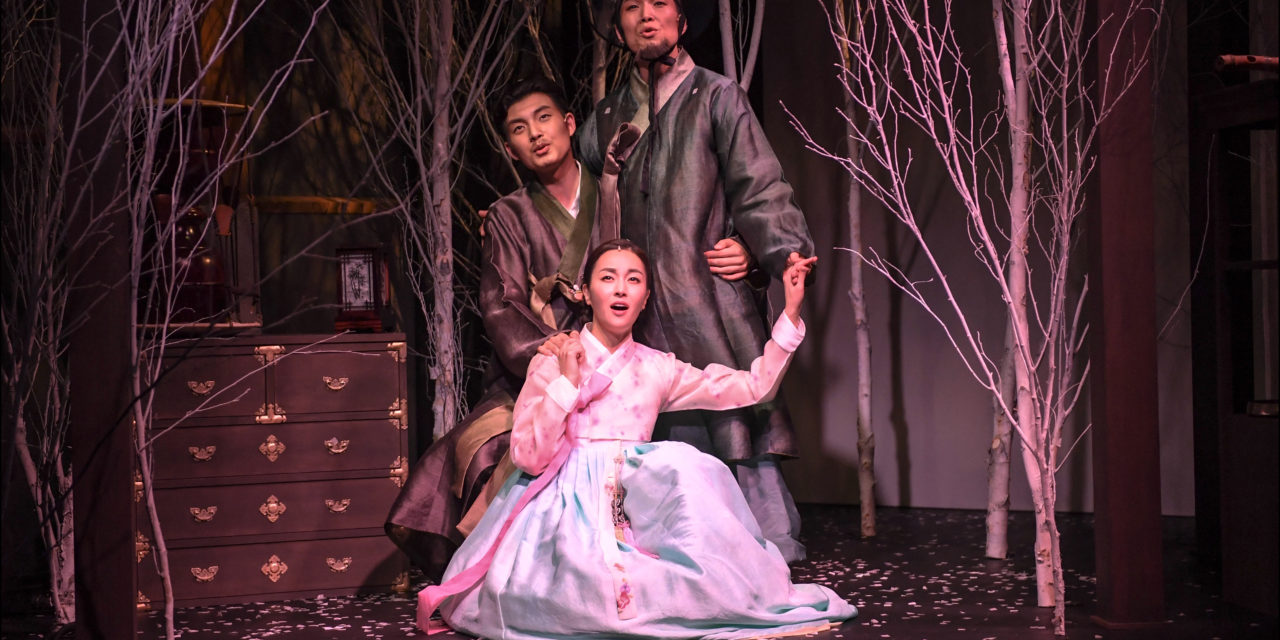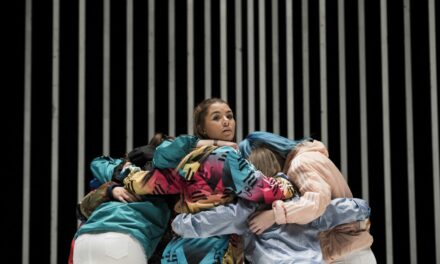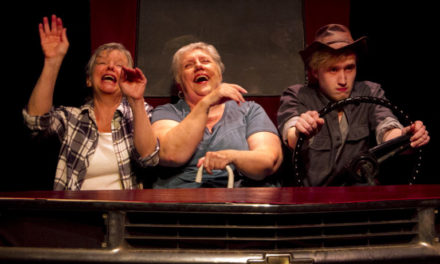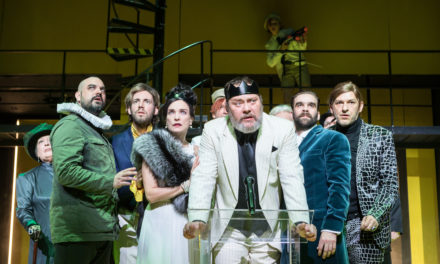I went to the Seoul Donhwamun Traditional Theatre in early November, the night of the first full moon after the Chuseok holidays. After getting lost in the maze-like neighborhood, I was pleasantly greeted by the traditional hanok architecture of the new performing arts center. The entrance lay between Changdeokgung Palace and Jongmyo Shrine, two historic sites in the heart of Seoul. Inside, there is a beautiful yard surrounded by a low, tile-roofed wall. The performance hall was in the second-story basement, a small and intimate space where raked audience seating looked down on the stage.
A Song Of Dewdrops (November 3–24, 2017) is the new theatre’s inaugural production, a musical theatre piece directed by Chung Young-du, with book and lyrics by Pai Samshik and music by Choi Woo-jung. Comprising elements of pansori and jeongga, traditional Korean music and Western music, A Song Of Dewdrops resembles the venue that it premiered in, combining the coziness of hanok with the practicality of modern architecture. Sejong Center for the Performing Arts has run the facility since construction ended in 2016. I am hopeful that Donhwamun Theatre can serve as a lasting base for the preservation of traditional Korean arts.
Giving Form to Music
According to the program, the piece’s Korean title, Jeokro, means “falling dewdrops.” But the composite word is a pun that can alternatively refer to “drops of condensation that fall from a wind instrument,” as well as “drops of blood falling from an instrument steeped in a musician’s artistic spirit.” This evocative title reflects the production’s dominant imagery. When I imagine what the recurring melody of “Play me a tune on your flute” would look like when notated on paper, I see the image of a dewdrop rolling down a leaf onto another, bouncing slightly before it falls off.
Choi, the composer, explains that dewdrops are the inspiration for all of the main themes in the piece (Falling Dewdrops, Emptiness, and We Are All Alike.) Varying styles and genres of music—sophisticated and vulgar, classical and popular, Western and Korean—coexist in this droplet, expressed as a delightful mélange of sounds by instruments from the West (clarinet, synthesizer) and Korean tradition (daegeum, ajaeng, drums). Sometimes you hear formal pansori or jeongga, other times folksongs and dirges. The creators successfully juxtapose and collide different types of sound rather than stubbornly adhere to one source. The call-and-response culture of traditional Korean music further enlivens the atmosphere. The night I attended, it was mostly the drummer and one exceptional connoisseur who responded vocally to the singing, but it was enough to pull the audience into the performance.
[Translator’s note: Called guimyungchang (master listener), audience members familiar with the pansori repertory who can respond appropriately and intensely to the performance are considered valuable in traditional music culture.]
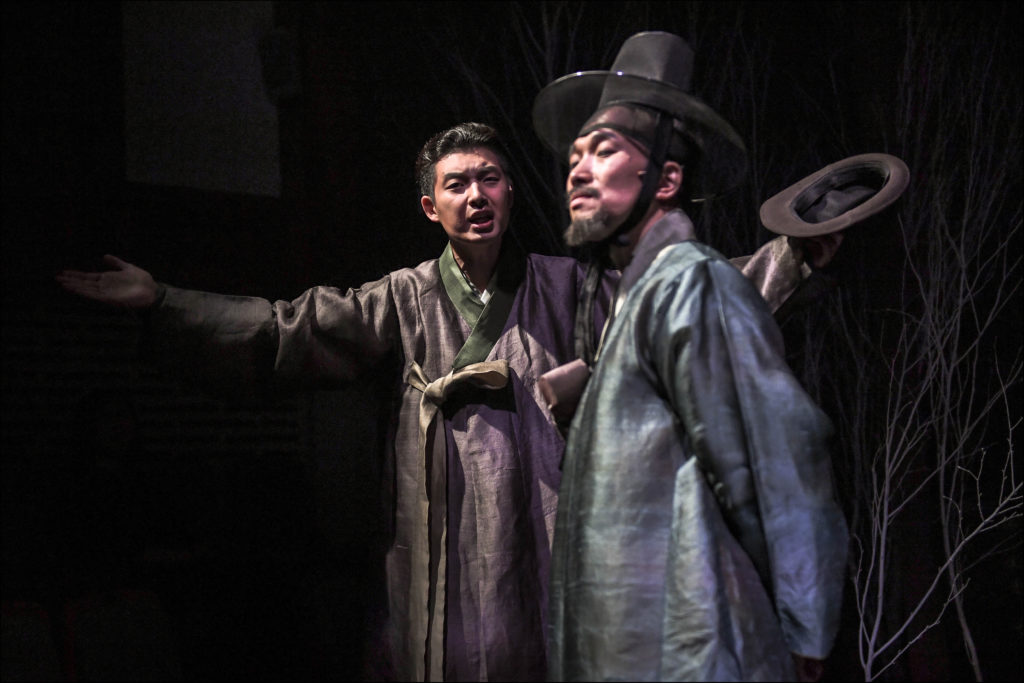
A Song Of Dewdrops. Photo courtesy of Seoul Donhwamun Traditional Theatre.
On Disappearance
Dewdrops form in the early morning moisture and vanish once the sun rises. It symbolizes the fragility of existence, and in that regard resembles music, art, and life. A Song Of Dewdrops uses these associations to explore the lives of two master daegeum performers in the 1930s: Park Jong-gi and Kim Gye-seon. In the production, these musicians have spent their careers and lives together, but are about to part ways, perhaps forever. Gye-seon (played by Chung Yoon-hyung) begs Jong-gi (Ahn I-ho) not to leave Kyungsung (Seoul during the Japanese colonial era) in the number Play With Me A While Longer. But Jong-gi has made up his mind. Suddenly, a rickshaw puller enters with an invitation from an unidentified woman (Ha Yoon-ju). When they meet her, the men are surprised by her perfect resemblance to Sanwol, a close friend from the past (Is This A Ghost Or A Fox).
Sanwol, a talented singer and dancer in her own right, was a kisaeng, a high-class courtesan. The three had once dreamed of running away together to escape their problems (“Let’s Close Our Eyes and Run”). But Sanwol vanished without a word to her two friends. Her absence had weighed on the men’s hearts, her stage name becoming a symbol for their deep longing for the good old days. When they meet the Sanwol look-alike, they are immediately brought back to the past through music (“Time is Like Flowing Water”).
The mysterious woman reveals that she is Sanwol’s daughter. That day happened to be the anniversary of her mother’s death. The meeting allows the daegeum performers to overcome the pain of Sanwol’s withdrawal and untie the knot of lament in their hearts. Like a crescent emerging out of the new moon, the old face of their acquaintance returns in a new form (She Is Not Gone For Good). The final song harbors feelings of remorse and sadness towards the idea of disappearance in general (Valediction). To these artists, saying goodbye means not being able to hear one another’s song anymore.
“The flute’s last note fades to eternity,
When will my love reach you,
(…)
A drop of red drew falls in the emptiness,
You are heartless to go and not return.”
This song, and the piece as a whole, is about longing. Everything that changes and disappears in the flow of time—life, art, music—turns into cherished objects of longing. The present moment will never come again. People gradually drift away and never return. A Song Of Dewdrops asks us to take stock of the fleeting things around us.
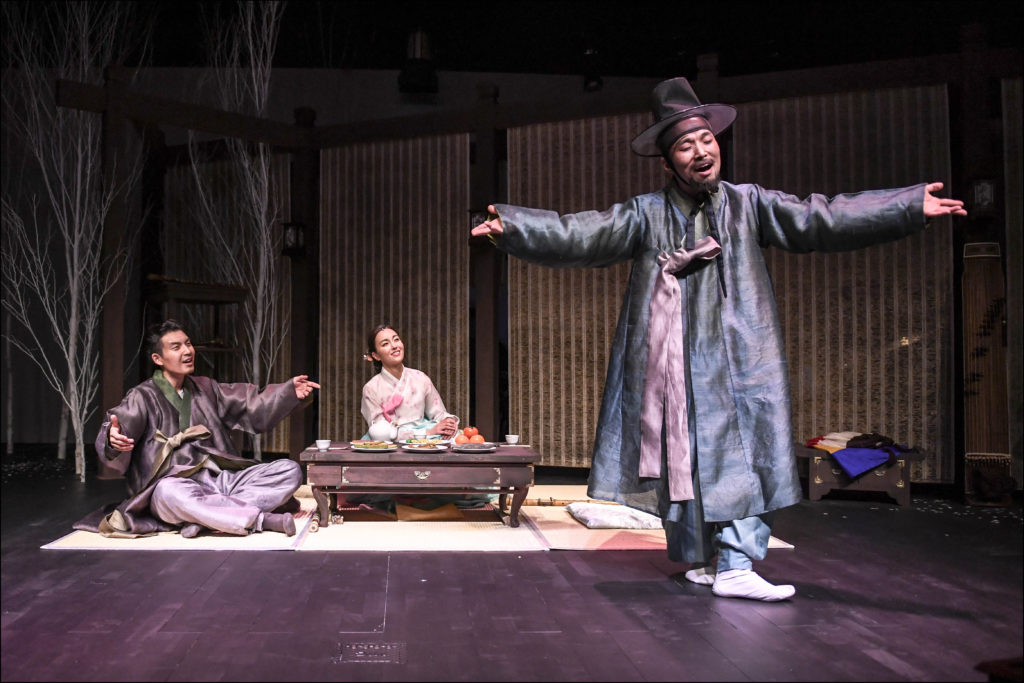
A Song Of Dewdrops. Photo courtesy of Seoul Donhwamun Traditional Theatre.
Noteworthy Songs
The piece’s eighteen songs carry the drama’s flow and tone so well that I had no need to consult the script apart from the lyrics. One of the songs that best expresses the theme of disappearance is the fourth number, Together Forever: Dewdrop Falling On A Leaf.
“A dewdrop falling on a leaf
Has already dried.
(…)
The dew will come again in the new morning,
But when will you return once you go?”
Another song, Time Is Like Flowing River, compares a lifetime to a dewdrop.
“A person, a person’s life
Is dew in the moonlight, in the morning wind
That vanishes in the sun, a droplet of dew.”
The turbulent life of artists who devote their souls to music is the subject of the thirteenth song, Gye-seon’s Self-lament.
“To sacrifice a life for one sound, an elusive sound, to roam endlessly like a rumor, removed from the world. Is anything emptier than the life of a traveling musician? My father is livid, but kneeling before him in penitence, my mind is drawn to the flute. The music I heard yesterday flutters about my ears. I follow the notes with my fingers.
(…)
The world is tinged with my madness, with the sound of my remorse. It overflows and spills, yesterday and tomorrow. What to do with this mad heart?”
These artists live in a constant state of ecstasy. Their fate is to suffer and vanish. As I try to write this essay based on my memory of the performance, I feel the limits of putting music into words. It was a pity that they wore body mics, but the singers, as well as the accompanying musicians, were all accomplished. Since Park Jong-gi and Kim Gye-seon were master daegeum players, I wished for scenes of them playing their instruments—a missed opportunity. I try to imagine how audiences long ago would have been transported by their historical counterparts. The director found ways to divide the relatively small stage into distinct locations and move fluidly among them. The performers’ dances in exquisite hanbok costumes were also beautiful.
A Song Of Dewdrops is an impressive experiment that mixes various musical sensibilities on top of a strong foundation in traditional Korean music. I look forward to similar attempts in the future, as this kind of musical theatre can appeal to contemporary audiences.
Song Minsook is a theatre critic with a Ph.D. in French Literature specializing in Jean Racine and neoclassical French drama. She is Lecturer at Yonsei University. Her books include Drama and Rhetoric 1 & 2, Language and the Rhetoric of Images 1 & 2, and her translations of Phèdre and La tragédie Classique. Her current research examines the persuasive power of performance in terms of language and image.
Translated and edited by Kee-Yoon Nahm.
This article was originally published in Korean Theatre Journal, the official journal of the International Association of Theatre Critics – Korea. Reposted with permission.
This post was written by the author in their personal capacity.The opinions expressed in this article are the author’s own and do not reflect the view of The Theatre Times, their staff or collaborators.
This post was written by Song Minsook.
The views expressed here belong to the author and do not necessarily reflect our views and opinions.

